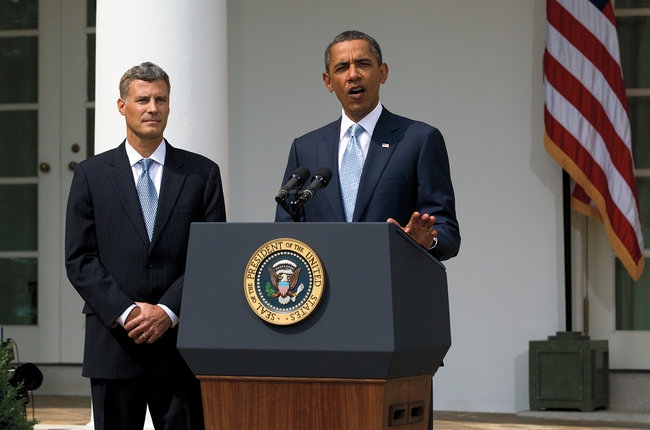During the past decade, Alan Krueger -- a Princeton University economics professor who served as chairman of the White House Council of Economic Advisers under President Barack Obama -- has been turning more attention to an unlikely subject that he believes can enrich the field of economics: music fans.
After writing a New York Times column about the economics of Super Bowl tickets in 2001 ("If the price is set artificially low, a secondary market will develop," he wrote), Krueger began studying concert ticket pricing, and now has helped organize the Music Industry Research Association (MIRA), which will hold its inaugural conference Aug. 10-11 at the University of California, Los Angeles.
By bringing together economists from around the world to discuss copyright, royalty payments and streaming, Krueger is hoping to shed light on not only the music business but the broader economy as well. "We can make some breakthroughs," he says, noting that a variety of businesses could learn from how the perception of "fairness" can act as a "restraint" on live-music pricing. (It doesn't in most sectors.)
"Artists care about their image," he says. "There's a tension between that and charging what the market will bear. The question is, how do you create that sense of fairness?"
A lifelong Bruce Springsteen fan who met The Boss at Obama's farewell party at the White House, Krueger says the live industry is moving in the direction of tiered pricing. "If you look at the secondary market, consumers are willing to pay much higher prices for the best seats. And why should scalpers make that money -- why not performers?" he says, adding that fans' attitudes may change over time. "When Uber started surge pricing, they almost faced a rebellion. Now it's understood as a way of matching drivers to customers, and a more efficient allocation of resources."
Billboard: You were the chairman of the White House Council of Economic Advisors. How did you end up studying such a disreputable business?
Alan Krueger: I used to have a column in The New York Times, and one week I wrote about the economics of Super Bowl tickets, and afterward I got a call from Gary Bongiovanni at Pollstar. He said that, “We have a problem in our industry – prices are growing too fast.” I couldn’t think of another business where anyone would say that. I saw that historically bands underpriced concerts to sell more albums but since Napster destroyed album sales they started to treat concerts as a more important source of revenue, so prices were moving up.
There are also more prices for different kinds of seats. Does that help artists and promoters generate more revenue while making some tickets more affordable?
Tiered pricing is the direction the industry is moving in. From an economics perspective, greater variation in pricing makes sense; if you look at the secondary market, it’s clear that consumers are willing to pay much higher prices for the best seats. And why should scalpers make that money – why not performers?
The Music Industry Research Association conference goes far beyond this, though – you have presentations on everything from licensing to metadata.
I found other economists and social scientists who work on music, and this work could have broader relevance. Alfred Marshall [in the late 1800s] and Sherwin Rosen [separately, in a 1981 paper] asked why superstars are paid so much more than those a notch down and it led to some interesting economic theories. It’s about the scale of markets. In music, the best artist has enormous reach, but a heart surgeon cam only operate on so many people.
You’ve spoken about a study by Matthew Salganik and Duncan Watts that shows how the belief that a song is popular can help make it popular, even if it wasn’t actually popular in the first place. Why does that happen?
Music is still very much a superstar affair – the top 1% of songs account for 86 percent of all the music that’s heard. We’re social beings – people now have endless choice but they’re flocking to what other people tell them is the best. There are other goods like that – popular restaurants, for example.
From an economic perspective, how much has digital technology changed the music business? A friend once heard someone say that Abbey Road Studios can fit inside a laptop, and he asked where they fit in [Beatles producer] George Martin. Some of the costs of making music have plummeted, but others really haven’t changed all that much.
That’s related to Baumol’s disease. William Baumol, an economist who was a friend of mine, and just died at 95, said, think of a Mozart string quartet – it takes four musicians the same amount of time to play the piece as it did 100 years ago, while manufacturing a car requires much less labor than before.
Having every song ever recorded available at our fingertips improves the quality of our lives – that’s productivity growth. But it takes just as much effort and sweat to write and record music as before.
The music publishing business operates very differently from recorded music, because it’s so heavily regulated – the government sets mechanical royalty rates, and ASCAP and BMI negotiate licenses under antitrust consent decrees. Do you plan to research that?
That’s an interesting question, and it’s an area where I think that economics has a lot to contribute. Economists think a lot about the nature of property rights, and we think people should pay for things that many non-economists think are free, which can still be controversial.
So how do you think about copyright?
There’s a real risk that if we ignore the rights of copyright holders, we’re going to have much lower quality content produced in the future. Our economy is very much a creative economy – the U.S. produces the best content. The physical devices can be made anywhere.
The Obama Administration seemed a bit divided on this.
There was definitely a tension that I saw between Silicon Valley companies and film companies. But I think it’s very difficult for any kind of enlightened policy to emerge in the current environment – Congress doesn’t like to address hard issues unless there’s an imminent crisis.
You grew up in Livingston, NJ, as a Springsteen fan. Any great stories?
I got to meet Springsteen once, at the White House, at Obama’s farewell party. I told him that I had just finished reading his autobiography and I found out he wrote “Born to Run” about two blocks from where my parents lived in Long Branch. He was nice enough to appear interested.
What would happen if you ran into Chris Christie at a Springsteen concert?
Chris was actually in the class the year behind me at Livingston High School, and he was a very good baseball player. Given the Governor's historic low approval ratings, I would say that his glory days were definitely in high school.








